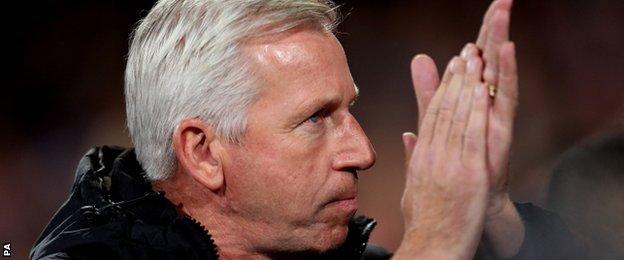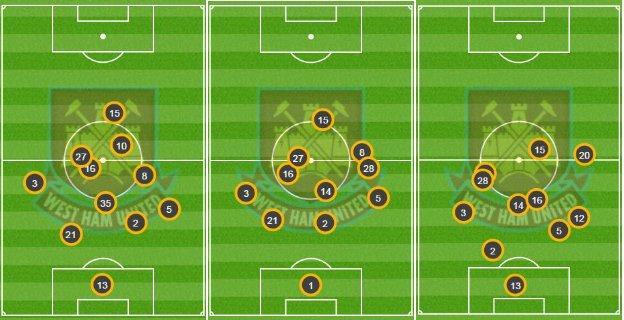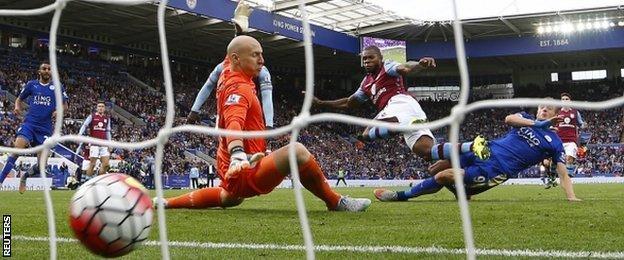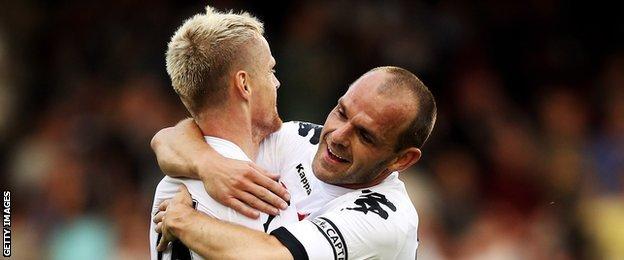Premier League: Need for speed behind counter-attacking success

Last updated on .From the section Football

A lot has been made of the rise of counter attacking as a tactic in the Premier League this season, but there is nothing particularly new about it.
It is not as if more teams are doing it than before, but it is being highlighted because the likes of West Ham, Leicester and Crystal Palace have had notable successes playing that way.
What I think has changed is that more managers understand the need for pace.
That has always been important, of course, but I've noticed a difference in recruitment recently in that a lot of our top-flight clubs now see it as the top priority when they look for signings.
Most teams play a way that suits their players, and if lesser clubs now have more players with speed who can get up the other end of the pitch quickly then that alone gives them a great chance to excel on the counter attack, so no wonder they are doing it.

The philosophy of playing home and away
Counter attacking is often associated with the away team or the underdog because your obvious tactic in that situation is to protect what you have got.
That is in contrast to the philosophy of playing at home, where the expectancy of your fans creates a need for your team to attack and press high up the pitch. At the bigger clubs, their supporters expect their team to dominate possession too.
So playing on the counter attack is often forced on the away team. I can also remember it just happening subconsciously, rather than as a deliberate tactic.
Whatever the circumstances, in my 15 years playing in the Premier League, the lesser clubs would generally always set up to play that way when they went away from home, especially to a bigger team.

When I was at Fulham, for example, very rarely would we go to a big team and go hell for leather and try to match them.
Instead we would try to keep a good shape and break when we could, something that seems to be working for a lot of teams at the moment.
So far this season, there has been a far greater percentage of away wins than in any of the previous 10 campaigns - 37% in 2015-16 compared to an average of 28% between 2005-06 and 2014-15 - and far fewer home wins - 34% compared to 47%.
It is fascinating to see there have been more away wins (26) than home wins (24) in the 70 Premier League games played so far in 2015-16 but that could be misleading because of how the fixtures have fallen so far.
A better way of showing that away teams are doing much better this season is to compare the games played so far with the corresponding fixtures from last season, replacing relegated teams with promoted ones and seeing how the results match up.
When you do that, 47% of the same fixtures last season ended in home wins, and only 27% saw away successes, meaning both figures are almost identical to the 10-year averages.
The increase in away wins is not just down to teams counter attacking, but it has been highlighted because West Ham, Leicester and Palace all play that way and they have produced some brilliant performances on the road.
Discipline, energy and mental strength
As well as pace in attack, you need to be well organised defensively and stay patient and focused if you want to be successful playing on the break.
Look at West Ham, who have done exactly that three times to win at Arsenal, Liverpool and Manchester City.

The Hammers' back four, and the midfielders shielding them, were awesome in the way they stayed disciplined deep in their own half and held their positions. They were not getting the ball for long periods, which made it even harder.
That does not just happen by accident - it comes from work on the training pitch, as does fitness, which is another important factor.
It is a risky way of playing because if you do concede the first goal you obviously have to change your approach but that relies on more than just reacting with a change of tactics.
Leicester have shown with the way they have come back from a goal or more down so many times this season that their energy and fitness levels are really high.
It means that in the second half of games they can keep up the same tempo of play in defence and attack when the opposition is getting tired.

Results build belief in counter-attacking system
There are statistics for sprints and ground covered but none for the mental strength you need to play this way too.
Some attack-minded players want to express themselves and this is not a style of play for them - if two or three players in your team are not on board then it will not work.
Again, when I was with Fulham, we knew as a team and as a collective the way we were going to play and, even though we had our critics for being a bit negative, we knew it worked - even at home.
We made Craven Cottage a bit of a fortress under Roy Hodgson, even though if you sat in the stand we would often look like we were the away team.

We played deep because we did not have great pace in our centre-halves but we screened them well and we broke quickly, using the pace of Andy Johnson and Damien Duff and with Bobby Zamora to aim at as an out-ball.
I remember lots of games where I was back helping out our back four on the edge of the area and Andy would be next to me chipping in in the right-back area because we were hanging on to a 1-0 lead.
It worked for us, ultimately because of our results. If you win games playing that way, then your belief just grows and grows.
You can see that has happened with Leicester, even though they changed managers over the summer. Because of the way they finished last season they realised the way they were playing suited them, and they have carried that over.
Why it won't work for every club
One of the things about counter-attacking football is that it is not always pretty.
West Ham, Palace and Leicester are all near the bottom of the Premier League rankings for number of passes, passing accuracy and possession in 2015-16.
| Premier League 2015-16 (and rank) | |||
|---|---|---|---|
| Team | Passes per game (average) | Passing accuracy | Average possession |
| Crystal Palace | 331 (19) | 76% (16) | 42% (18) |
| Leicester | 329 (20) | 72% (20) | 41% (19) |
| West Ham | 364 (16) | 74% (18) | 43% (16) |
Does that matter? No, not if the results are good because then their fans will not care one bit. If anything, they will love it.
The important thing is that when they do attack, they do so with numbers and do it effectively, and all three of those teams can do that.
| Premier League 2015-16 (and rank) | |||
|---|---|---|---|
| Team | Goals | Shots | Shots per goal |
| Crystal Palace | 9 (=10) | 68 (10) | 7.6 (11) |
| Leicester | 15 (=1) | 74 (7) | 4.9 (3) |
| West Ham | 15 (=1) | 60 (12) | 4 (1) |
Yes, ideally you would like your possession ratios to be nearer 50-50 in games in order to be more competitive but when you look at the quality of the opposition that, say, West Ham have faced then you can understand why they had to sacrifice that.
Those statistics show why this style of play does not work for every club, though.
When I was at Liverpool, our passing, passing accuracy and possession was important to the way we played and part of the identity of the club.
There is no way we would have just played on the break at home, because our fans would not have accepted it.
They expected us to go after teams and, in contrast to when I was at Fulham, we would expect to dominate possession because, in most matches, we had the better players.
It is the same anywhere in Europe - you will never ever get the top teams with the best players going to a lesser team and putting men behind the ball, sitting back voluntarily and waiting to counter.
They will have the ability to do it but, unless they are up against someone like Barcelona, it will never be a game plan in the same way you see Palace, West Ham or Leicester do it.
Danny Murphy was speaking to BBC Sport's Chris Bevan.